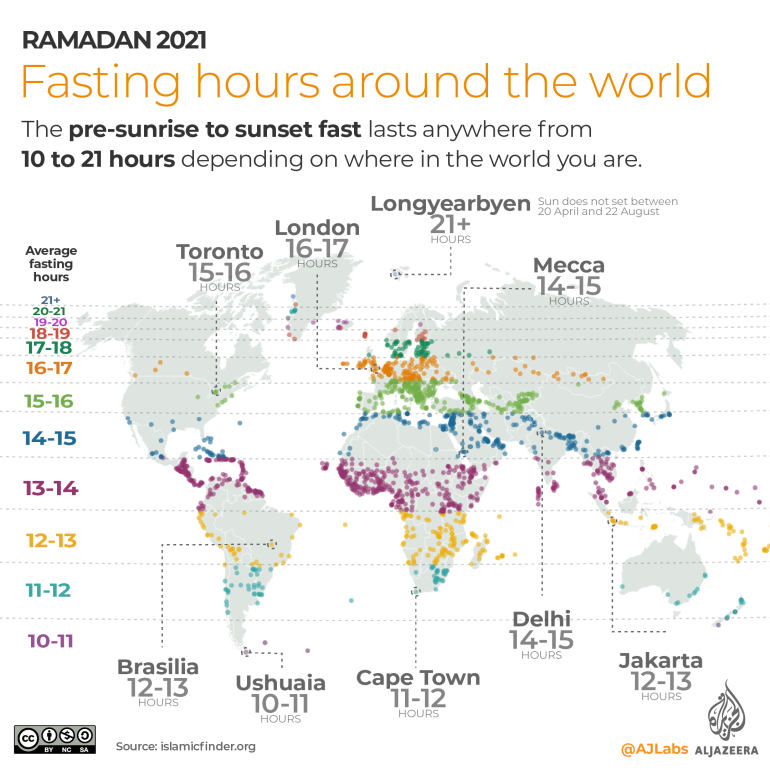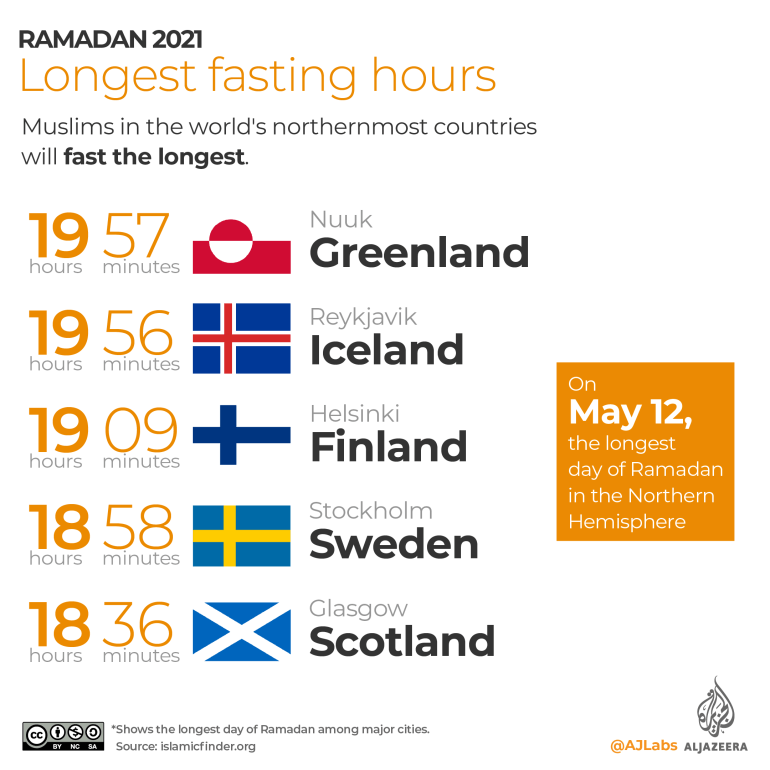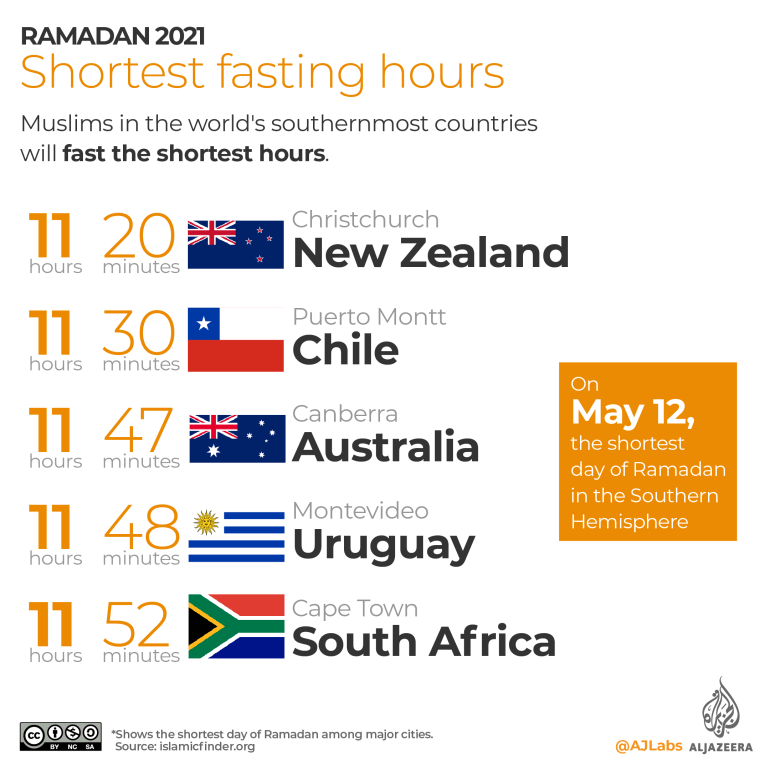This year the Muslim holy month of Ramadan starts in April 13, 2021. The pre-sunrise to sunset fast lasts anywhere from 10 to 21 hours depending on where in the world you are.
The fast entails abstinence from eating, drinking, smoking and sexual relations to achieve greater “taqwa”, or consciousness of God. Ramadan begins 10 to 12 days earlier each year. This is because the Islamic calendar is based on the lunar “Hijri” calendar with months that are 29 to 30 days long. The next time Ramadan will start around April 13 will be about 33 years from now, or the year 2054.

The number of daylight hours varies from country to country. Muslims living in the world’s southernmost countries such as Chile or New Zealand will fast an average of 11 hours while those living in northern countries such as Iceland or Norway will have an 18+ hour fast.
For Muslims living in the Northern Hemisphere, the number of fasting hours will be a bit shorter this year and will continue to decrease until 2032, which is the year Ramadan will fall during the winter solstice – the shortest day of the year. After that, fasting hours will increase until the summer solstice – the longest day of the Northern year. For Muslims living south of the equator, the opposite will happen.
Below are the number of fasting hours in cities around the world. Actual fasting hours and times will vary by day, as well as calculation methods:

In extreme northernmost cities such as Longyearbyen, Norway, where the sun does not set from April 20 to August 22, religious rulings, or fatwas, have been issued to follow timings in Mecca, Saudi Arabia, or the nearest Muslim country.
– Nuuk, Greenland: 19-20 hours
– Reykjavik, Iceland: 19-20 hours
– Helsinki, Finland: 18-19 hours
– Stockholm, Sweden: 17-18 hours
– Glasgow, Scotland, UK: 17-18 hours
– Oslo, Norway: 17-18 hours
– Copenhagen, Denmark: 17-18 hours
– Moscow, Russia: 17-18 hours
– Berlin, Germany: 16-17 hours
– Amsterdam, the Netherlands: 16-17 hours

– Warsaw, Poland: 16-17 hours
– London, UK: 16-17 hours
– Paris, France: 16-17 hours
– Nur-Sultan, Kazakhstan: 16-17 hours
– Brussels, Belgium: 16-17 hours
– Zurich, Switzerland: 16-17 hours
– Bucharest, Romania: 15-16 hours
– Ottawa, Canada: 15-16 hours
– Sofia, Bulgaria: 15-16 hours
– Rome, Italy: 15-16 hours
– Madrid, Spain: 15-16 hours
– Lisbon, Portugal: 15-16 hours
– Athens, Greece: 15-16 hours
– Beijing, China: 15-16 hours
– Washington, DC, US: 15-16 hours
– Pyongyang, North Korea: 15-16 hours
– Ankara, Turkey: 15-16 hours
– Rabat, Morocco: 14-15 hours
– Tokyo, Japan: 14-15 hours
– Islamabad, Pakistan: 14-15 hours
– Tehran, Iran: 14-15 hours
– Baghdad, Iraq: 14-15 hours
– Beirut, Lebanon: 14-15 hours
– Damascus, Syria: 14-15 hours
– Cairo, Egypt: 14-15 hours
– Jerusalem: 14-15 hours
– Kuwait City, Kuwait: 14-15 hours
– Gaza City, Palestine: 14-15 hours
– New Delhi, India: 14-15 hours
– Hong Kong: 14-15 hours
– Dhaka, Bangladesh: 14-15 hours
– Muscat, Oman: 14-15 hours
– Kabul, Afghanistan: 14-15 hours
– Riyadh, Saudi Arabia: 14-15 hours
– Doha, Qatar: 14-15 hours
– Dubai, UAE: 14-15 hours
– Aden, Yemen: 13-14 hours
– Addis Ababa, Ethiopia: 13-14 hours
– Dakar, Senegal: 13-14 hours
– Abuja, Nigeria: 13-14 hours
– Colombo, Sri Lanka: 13-14 hours
– Bangkok, Thailand: 13-14 hours
– Khartoum, Sudan: 13-14 hours
– Kuala Lumpur, Malaysia: 13-14 hours
– Singapore: 13-14 hours
– Nairobi, Kenya: 13-14 hours
– Luanda, Angola: 12-13 hours
– Jakarta, Indonesia: 12-13 hours

– Brasilia, Brazil: 12-13 hours
– Harare, Zimbabwe: 12-13 hours
– Johannesburg, South Africa: 11-12 hours
– Buenos Aires, Argentina: 11-12 hours
– Ciudad del Este, Paraguay: 11-12 hours
– Cape Town, South Africa: 11-12 hours
– Montevideo, Uruguay: 11-12 hours
– Canberra, Australia: 11-12 hours
– Puerto Montt, Chile: 11-12 hours
– Christchurch, New Zealand: 11-12 hours



















